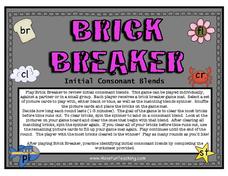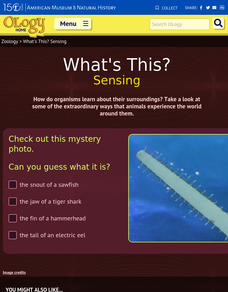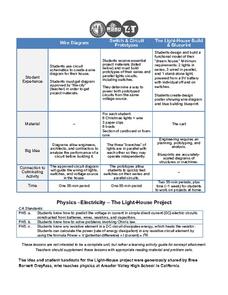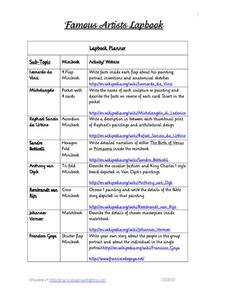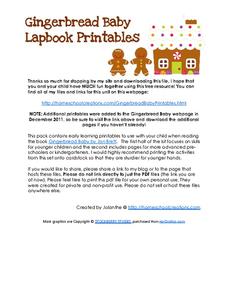Richmond Community Schools
Map Skills
Young geographers will need to use a variety of map skills to complete the tasks required on this worksheet. Examples of activities include using references to label a map of Mexico, identify Canadian territories and European...
K12 Reader
Improve Your Writing with Similes
A language arts worksheet works like a dream. Class members become as busy as bees as they complete a activity geared toward similes. The layout of the sheet is as clear as crystal, with directions that are easy to follow.
Baylor College
They're Everywhere: Bacteria
Totally gross out your class with the eighth lesson in this series on food science. Explore the microscopic world of bacteria by taking swabs of different classroom objects and growing colonies in petri dishes. An engaging activity that...
Baylor College
Using Food Labels
Help your class make sense of nutrition labels with the ninth lesson plan of this series. After explaining the different information provided on packaged food labels, perform an activity that demonstrates the amount of sugar in a single...
Have Fun Teaching
Brick Breaker: Initial Consonant Blends
Practice initial consonant blends with a fun, interactive game! Choose the sounds you'd like to practice, and then have kids place the appropriate pictures for their brick breaker boards. Spin the spinner to select a blended sound, and...
Outdoor Learning Center
Outdoor Survival
Which of the following can you survive without for the longest time: water, food, or a positive mental attitude? The answer may surprise you. Guide learners of all ages through games, activities, and discussions about surviving in the...
Penguin Books
A Teacher's Guide to William Shakespeare's Hamlet
Should Hamlet avenge his father's death? Is the ghost telling the truth or is it trying to trick Hamlet? Is Hamlet's inconsistent behavior a ploy or is he really insane? Something really is rotten in Denmark, and with the help of the...
Project Maths
The Unit Circle
It's not just any circle—it's the unit circle. The fourth lesson in the series is an introduction to the famous unit circle. While working through a series of activities, young scholars learn the components of the unit circle and how to...
Curated OER
Hatchet: Vocabulary Strategy
Want your class to use critical thinking when discussing vocabulary? Go beyond the dictionary with a vocabulary activity based on Gary Paulsen's Hatchet. Kids write the word in the center of a graphic organizer that also provides...
Curated OER
Mississippi Trial, 1955: Vocabulary Strategy (Acquisition)
Readers of Mississippi Trial, 1955 engage in a desktop teaching activity and teach other class members the meaning of a word from Christopher Crowe's novel using an embellished illustration of their word.
EngageNY
Writing and Evaluating Expressions—Exponents
Bring your young mathematicians into the fold. Scholars conduct an activity folding paper to see the relationship between the number of folds and the number of resulting layers in the 23rd installment of a 36-part module. The results of...
US National Archives
WWII: Asia 1939-45 – Burma
Because World War II encompassed most of the globe in one way or another, many pivotal battles and events are not as visible in the history books, leaving veterans of these conflicts feeling overlooked by more famous skirmishes. High...
American Museum of Natural History
What's This? Sensing
There is a scallop that relies on sight so much that it actually has more than 100 eyes! There are many species that rely heavily on one sense or another. An online interactive resource has youth read about several of these animals. The...
Curated OER
Sentence Completion 11: Low-Advanced SAT Level
Context clues can be used to determine the meaning of unfamiliar works; likewise, they can be used to determine the correct answer on a sentence completion exercise. Using context clues is just one of the many strategies detailed in the...
Baylor College
How Much Water Do Humans Need?
Physical or life science learners measure the amounts of water eliminated by intestines and the urinary system, and the amounts lost via respiration and perspiration. In doing so, they discover that the body's water must be replenished...
Curated OER
Affixes and Roots
Here is a skills practice sheet that instructs fourth graders to form words using affixes and root words. After reading 16 clues, individuals match an affix to a root word in order to create the word that best fits the clue.
Trash For Teaching
The Light-House Project
Groups work together to design a lighthouse, from designing and drawing the wiring diagram, to creating prototypes of the switch and circuit, to envisioning and building a scale model along with a blueprint. By including different...
Novelinks
The Little Prince: Biopoem Strategy
Learn about character traits with a biopoem activity. Based on Antoine de Saint-Exupéry's The Little Prince, the activity prompts learners to fill in the blanks of a poem form to describe themselves.
Practical Pages
Famous Artists Lapbook
Create mini books with some of the most beautiful and well-known masterpieces of our time. Learners read short paragraphs about famous artists such as Pablo Picasso, Leonardo da Vinci, and Johannes Vermeer, and create different kinds of...
Homeschool Creations
Gingerbread Baby and Lapbook Printables
The perfect companion to Jan Brett's Gingerbread Baby is a series of printables featuring several different types of activities. Kids can practice handwriting, spelling, matching, and drawing with gingerbread baby cutouts....
Mathematics Vision Project
Geometric Figures
Logical thinking is at the forefront of this jam-packed lesson, with young mathematicians not only investigating geometric concepts but also how they "know what they know". Through each activity and worksheet, learners wrestle with...
US National Library of Medicine
Science and Society: Preventing the Spread of Disease
Looking for a valuable resource on the spread of infectious diseases? Here is a instructional activity in which pupils simulate the spread of diseases and learn about how to prevent them from spreading. Class members read case studies...
Channel Islands Film
Island Rotation: Lesson Plan 1
How do scientists provide evidence to support the theories they put forth? What clues do they put together to create these theories? After watching West of the West's documentary Island Rotation class members engage in a series of...
Thoughtful Learning
Setting and Reaching Goals
An activity boosts self-management through goal setting and reflection. Scholars choose one goal they wish to obtain by the end of the week. Participants brainstorm ways to make their goal a reality then reflect on whether or not their...




